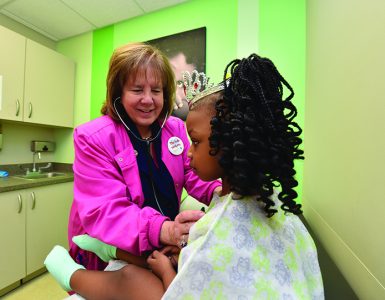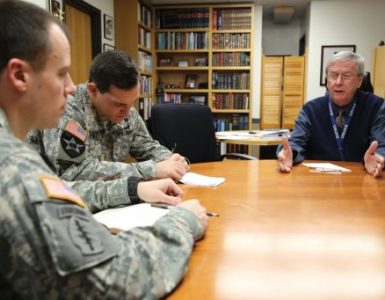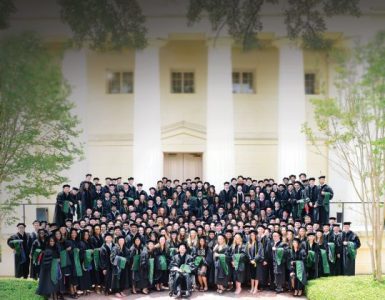Dr. Alan Herline
J. Harold Harrison, MD, Distinguished Chair in Surgery
The colon and rectal surgeon established and directed the Colon and Rectal Surgery Program at Vanderbilt University. He is a 1994 graduate of MCG and now vice chair of the MCG Department of Surgery, chief of the Section of Minimally Invasive and Digestive Diseases Surgery and associate director of Augusta University’s Digestive Health Center.
• The Harrison University Chair in Surgery is the first of 10 endowed chairs to be established through a $66 million gift by the late, renowned vascular surgeon and 1948 MCG graduate, Dr. J. Harold Harrison and wife Sue. The Kite, Georgia, native finished his schooling in his hometown by age 15, spent a year at Georgia Military College Prep High School in Milledgeville, then six quarters at the University of Georgia before arriving at MCG at the tender age of 18. After a residency at Atlanta’s Grady Health System and short stint at Emory, Harrison moved on to St. Joseph’s Hospital of Atlanta, where he established the country’s first vascular surgery training program and helped turn the hospital into a cardiovascular center. He retired from practice in 1999 and returned to his 6,000-plus-acre cattle farm in Bartow, Georgia.
Dr. Charles Linder
Ellington Charles Hawes Chair in Pediatrics
The 1963 MCG graduate is chairman of the MCG Department of Pediatrics and top medical officer for the children’s hospital. He was named director of the Division of General Pediatrics and Adolescent Medicine in 1972, professor in 1981, associate dean of medicine in 1985, and associate dean emeritus in 2001. He has served as an assistant hospital administrator, chief of staff, and chief medical officer. He served on the MCG Admissions Committee for seven years and helped bring the Ronald McDonald House to Augusta in the early 1980s. The Charles W. Linder, MD, Endowed Chair in Pediatrics was established in his honor in 2009.
• The Ellington Charles Hawes Chair was established by Hawes’ wife, Grace, to honor the man many knew simply as “Mr. Charlie.” The beloved Thomson native worked his way up from teller to president of the Bank of Thomson, a post he held until his retirement in 1960. He was a Georgia senator from 1953-54 and chaired the senate’s Banks and Banking Committee. An advocate of adequate health care for all, he chaired the McDuffie County Hospital Authority through the construction of the old McDuffie County Hospital. Hawes chose to honor her husband with a chair in pediatrics because of their mutual love for children.
Dr. Vincent J. B. Robinson
Glen E. Garrison, MD, Distinguished Chair in Cardiovascular Medicine
Robinson is a professor of medicine and radiology and director of MCG’s Cardiovascular Disease Fellowship Program. A nuclear cardiologist, his research focuses on developing a better D-Dimer test, which measures the blood for levels of a substance released when a clot breaks up.
Robinson is a founding member of the American Society of Nuclear Cardiology and a member of the American Heart Association’s Council for Clinical Cardiology and the American Federation for Medical Research.
• The Garrison Chair is named for the former chairman of community medicine, director of continuing medical education and professor of medicine who came to MCG in 1965. He helped design the first coronary care unit for the medical school’s hospital and still practices cardiology at the Charlie Norwood VA Medical Center. Garrison also developed, directed and taught popular courses on financial management for physicians. The separately endowed Garrison Annual Award to Cardiology Fellows provides additional salary to the now-named Garrison Chief Cardiology Fellow and supports an annual Garrison lecture. Both endowed funds require an emphasis on medical history from patients and family members, physical exam, electrocardiogram and chest X-ray.
Dr. Daniel Albo
Floyd C. Jarrell Jr., MD, Distinguished Chair in Surgical Oncology
Albo is director of Surgical Oncology Services and Health Services Research for the university’s Cancer Center and a pioneer in minimally invasive gastrointestinal surgical oncology. His research interests include the utilization, barriers and facilitators for minimally invasive colorectal surgery. He developed a unique re-training program that has helped transform open colorectal surgical units into minimally invasive ones. His work has resulted in over 100 publications and multiple research grants. He is president of the Association for Academic Surgery.
• Established in 2003, the Jarrell Chair honors the longtime Columbus, Georgia, ophthalmologist who established West Georgia Eye Care Center in 1951. The clinic is now the area’s largest multispecialty eye care practice. The 1946 MCG graduate served on the MCG Foundation’s Board of Directors from 1974-84, including three terms as president. He was a lifetime member of the MCG Alumni Association and served as its president in 1975. He was a member of the Medical Association of Georgia and past president of the Muscogee County Medical Society. He also was a past recipient of the Dr. Clarence C. Butler Service and Leadership Award, given to individuals who have had a significant impact on the quality of health care in the Columbus region.
Dr. Askiel Bruno
Amy G. Warren and Lamar Warren Distinguished Chair in Diabetes and Obesity in Radiology
Bruno joined the Department of Neurology in 2008. He is a principal investigator on the National Institute of Neurological Disorders and Stroke’s Stroke Hyperglycemia Insulin Network. SHINE is a multicenter, randomized, controlled trial of 1,400 patients that aims to determine whether intravenous insulin or the traditional insulin shot under the skin is better for patients with acute ischemic stroke and high blood glucose levels. Bruno co-authored the current American Stroke Association guidelines for treatment of acute ischemic stroke. He also serves on the American Heart Association’s National Research Grant Review Committee.
Established by 1925 alumnus Dr. Earl Warren in honor of his wife Amy and his brother Lamar. Three months after graduating medical school, Warren was diagnosed with active tuberculosis and sent to a sanatorium in New York to recover. While there, his brother, Lamar also contracted tuberculosis but refused to let Warren leave the sanatorium and go to work so he could pay for his brother’s care. Lamar died of tuberculosis in 1927. Warren’s wife Amy worked alongside him as a bookkeeper at his radiology practice.









